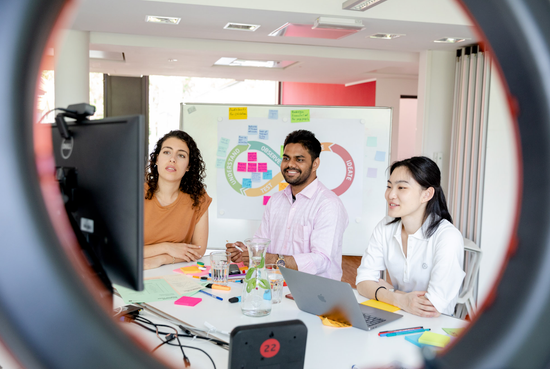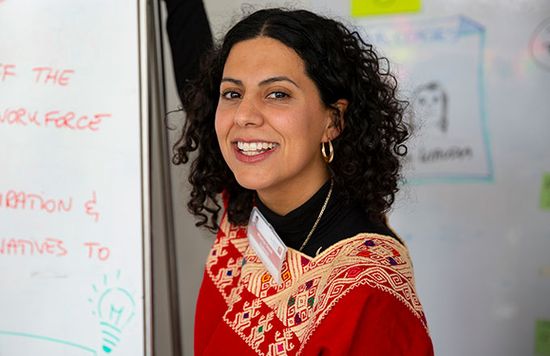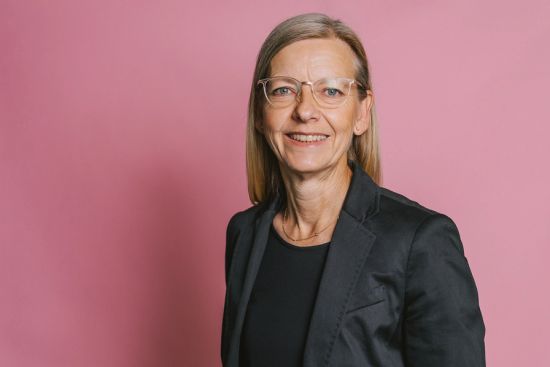
The HyFlex Advanced Track is an in-depth program for Design Thinkers with prior knowledge in this field. With the successful completion of one Basic Track or two Global Design Thinking-Weeks at the HPI D-School, our SUGAR-program at the HPI, or the completion of a foundational program at one of our partner institutions in China, Malaysia, South Africa or USA you now have a good foundational understanding of Design Thinking. Using this base, you will draw on a variety of tools, techniques, and strategies to help you work with even greater skill in the Advanced Track. Especially the new HyFlex format will give you a unique experience, no other D-School track had before you! With the possibility of using our facilities for Teamwork while having at hand all online learning materials! More practice leads to greater confidence, and the program relaxes the sophisticated innovation work to enable teams to move forward with greater flexibility. Teams also have more time to develop professional cooperation with their project partner over the 15-week program (+2 weeks for the documentation) at the HPI D-School.
This course is part of a research project investigating the potential and challenges of teaching design thinking in an online environment. Therefore your participation in the course surveys and feedback is valuable to us.
Language: English
Course information
This platform is mainly used to share content, and materials relevant for your project. Please make sure to check this page on a weekly basis to keep yourself up to date. Besides Open HPI, we will use Miro, Zoom, and Slack for our HyFlex semester.
Course contents
Welcome to the HyFlex AT:
Welcome to HyFlex Advanced Design Thinking Program from the coaches and the program leads. Include the program overview and learning journeyDocuments Repository:
This section contains all relevant documents regarding the semester's planning.The Challenges:
The section contains the challenges the AT teams will be tackling this term.Introduction to the Program
1st Iteration: Inspiration to Desirability :
Within the Inspiration Iteration, you are going to explore the challenge broadly and look to be inspired by many different sources that might be relevant to your project. This means, not only do you need to understand the given project challenge, but you have to plan, strategize, and conduct design-led research to be able to dig deeper into the design challenge, and to scope your most promising opportunity areas. Try to validate whether or not the project partner is on the right track with their assumptions. By mapping the system and stakeholders involved, you will identify gaps and issues, that help you frame various fields of opportunity, which you deem relevant and that should all be based on findings and insights gathered during your research. Eventually, you will be expected to build several quick and rough prototypes illustrating first ideas for each field of opportunity. During the 1st Interim Presentation, each team will present 3 fields of opportunity to their project partners online, solidified and illustrated by selected and tested prototypes. Besides the presentation, the first part of your documentation will be due to submit to the knowledge manager after your coach was able to give you feedback on your first draft.2nd Iteration: Co-Design to Feasibility:
In the Co-Design Iteration you will continue working on your identified Fields of Opportunity. After synthesizing your research and collecting feedback during the presentations and partner meetings, you are now able to dig deeper into the most promising FOOs. Jointly, with potential users, experts in the field, and project partners, you will engage and co-design to combine both desirability from a human perspective and feasibility from a technological perspective. In this phase, you have the chance to build closer bonds with potential users and project partners, already generating a higher level of "buy-in" for the solutions you create. On July 3rd you will present on the virtual stage WITH your project partners included in the presentation. The Deliverable will be the two most promising TESTED solutions – tangible as high-resolution prototypes.3rd Iteration: Implementation to Viability:
In the last weeks of the Advanced Track, you will focus on the path towards implementation. The objective is not to have the implementation plan finalized by the end of the semester but, rather, to provide a roadmap of what this implementation could look like: such as, key people or skills you believe are important to make your solution happen; bottlenecks , which might be challenging and need to be overcome; what the business design, branding, communication could look like etc. In other words, handing the project over to your project partner in a way that they are capable of continuing with your solution. We will have our final presentation at the virtual D-School where your team will present the 1-2 final solutions, along with high-resolution prototypes and a suggested path to make this project reality.Deep Dives & Inspirational Talks
Project Documentation:
This section includes the guidelines for your project documentation, submissions dates, design package and printing guidelinesPresentations - AT ST 2023:
In this section, you will find presentation templates and your recorded videos.Travel & Expenses:
Once you decide to go on a research trip, enhance your prototype, invite experts or do special testing, this will be the section to plan your trip/ expenses and get feedback on it! Please always make sure to follow the guidelines and do your planning early enough, so that you get the most out of you plans. :-)Project Posters
Wayfinder
Enroll me for this course
Learners
This course is offered by

María-José, hailing from Mexico City, is a program lead at the HPI School of Design Thinking since 2020, where she has co-designed and digitized our academic programs.
She has also been coaching design thinking since 2016 with projects spanning public, private and non-profit sectors. Including City Administration of Lübben, Landeshaupstadt Potsdam, BMW, Boiler Room, Roche, Humboldt University, Universidad de la Habana, British Council, city_lab, Melton Foundation, Politics for Tomorrow, Bundesverband Deutscher Stiftungen, D.Collective e.V., among others. For her, Design Thinking is more than an innovation-led methodology executed by an iterative process. It’s a mindset that challenges competitive social behaviors and fosters teams' diversification which leads to collaborative innovation.
Her educational background entails an MA in public policy from the Hertie School of Governance, specializing in Public Innovation Labs in Germany. A year certification of Basic and Advanced Track in Design thinking at the D-School which was life-changing. She also holds a BA in political science and public administration from the Universidad Iberoamericana.
With 10+ years of experience being a social entrepreneur: founding social enterprises/NGOs, both in Mexico City and Berlin focusing on community building, sustainability and women’s empowerment both in marginalized and indigenous communities.
She is passionate about diversity, decolonisation and climate justice.

Claudia Nicolai is the Academic Director of the HPI d—school in Potsdam, shaping Design Thinking education and research since 2010. With a Ph.D. in Strategic Management, she has a background in business, economics, and social sciences and has taught at the University of the Arts Berlin and Elisava Barcelona.
She leads the academic program, curriculum, and coaching at HPI d—school, manages partnerships, and has co-developed D-Schools in Malaysia and South Africa as well as the BioThinking program at Charité Berlin. Her research focuses on design and innovation management, new work environments, and leadership.